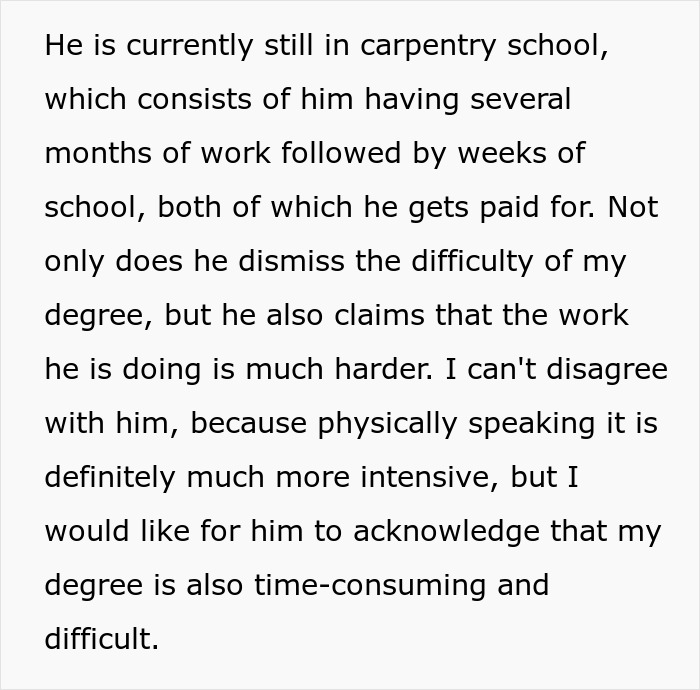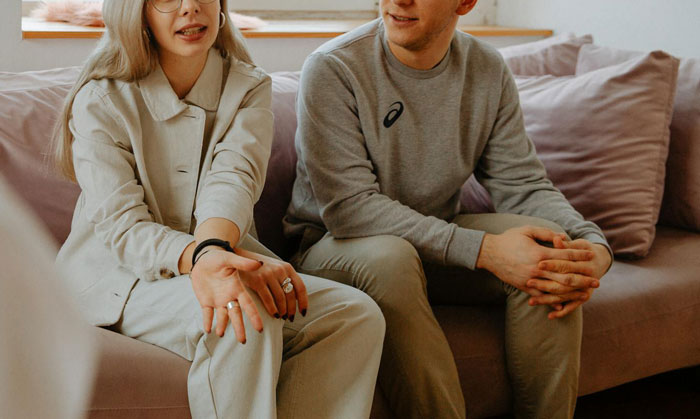It’s not uncommon for couples to disagree on things—after all, no relationship is perfect. But what do you do when those arguments start to get serious?
One woman took to Reddit, revealing that her fiancé had been making jokes about her degree and even suggested she quit her final year of studies. He felt it was a waste of time and money since she planned to be a stay-at-home wife anyway. Not knowing how to approach the situation, she turned to the internet for advice.
Read on for the full story, and don’t miss our conversation with psychologist Sabina Nazarova about how to resolve difficult fights.
More info: Instagram | Medium | Threads
The woman was in her final year of a biomedical sciences degree, hoping to graduate soon

Image credits: SHVETS production / Pexels (not the actual photo)
However, her fiancé insisted that she quit her studies and fully commit to becoming a stay-at-home wife





Image credits: Engin Akyurt / Pexels (not the actual photo)




Image credits: throwawaygirlie2003

Image credits: Polina Zimmerman / Pexels (not the actual photo)
Working through major arguments in a relationship takes effort, but it’s entirely possible
The story went viral on Reddit, with many commenters urging the woman to reconsider marrying her fiancé. But is a disagreement like this enough to end a relationship? To gain more insight, Bored Panda reached out to psychologist Sabina Nazarova for her perspective.
“The strong reaction is largely because they sense a lack of respect from her fiancé,” Nazarova explains. “It’s understandable, since respect is a key foundation for any healthy relationship. When one partner dismisses or ridicules the other’s goals, such as the woman’s pursuit of her degree, it can definitely raise red flags.”
According to Nazarova, the real concern isn’t just the disagreement itself, but the way it’s being handled. “In this case, the man’s ongoing dismissal of her education and his insistence on traditional gender roles might reflect deeper issues of respect, equality, and control,” she says.
For this story, it’s also worth noting that some cultural context is missing. Both the Netherlands and Denmark are quite individualistic societies that tend to emphasize gender equality. “While these countries lean toward progressive ideals, they are also diverse, with many ethnicities and cultural backgrounds influencing family dynamics and gender roles,” Nazarova says.
“Without knowing more about the couple’s specific cultural context, it’s difficult to fully understand the dynamics at play,” she adds. “However, traditional gender roles can often reinforce harmful stereotypes about men and women, potentially leading to inequality in relationships. Respecting cultural values is important, but it should never come at the cost of one partner’s ambitions or personal growth.”
Nazarova argues that major disagreements between couples, especially about significant future goals, can be managed if both partners are committed to open communication, empathy, and finding a compromise.
“Disputes like this one, over traditional gender roles versus career aspirations, can be resolved when both partners listen to each other’s concerns and work toward a mutually beneficial solution,” she says. “In this case, the woman’s desire to finish her degree and have a fallback option is entirely reasonable, as is the fiancé’s wish for a more traditional family structure. However, both must be willing to meet halfway and acknowledge each other’s values. I know it sounds like a lot to do, but it is possible—not easy.”
Before entering a long-term relationship or marriage, couples should have clear and open discussions about their values and long-term goals. Topics like career aspirations, gender roles, financial plans, and visions for family life are crucial to cover. “In highly individualistic and gender-equal societies like Denmark and the Netherlands, many couples expect both partners to support each other’s career aspirations and personal goals, so it’s important that both partners feel respected and valued in their decisions,” Nazarova says.
“Since both Denmark and the Netherlands are diverse countries with many different ethnicities and cultural backgrounds, it would be helpful to consider how cultural values may influence their perspectives on gender roles and family life,” she concludes. “Understanding the cultural context of the couple can offer deeper insight into their expectations. By discussing these values early on, couples can ensure they are aligned on major life decisions and build a strong foundation for their partnership.”
In the replies, the woman defended her fiancé, claiming that he respects her



Many commenters encouraged the woman to reconsider the relationship











Meanwhile, others felt that by staying with a controlling fiancé, the woman was failing to stand up for herself















